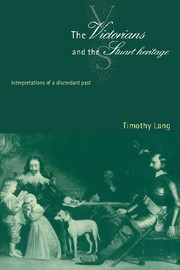Book contents
- Frontmatter
- Contents
- Preface
- Acknowledgments
- Introduction
- 1 Henry Hallam and early nineteenth-century Whiggism
- 2 Thomas Babington Macaulay and Victorian religious controversy
- 3 Puritanism and the ideology of Dissent
- 4 Samuel Rawson Gardiner and the search for national consensus
- 5 Cromwell and the late Victorians
- Epilogue
- Index
1 - Henry Hallam and early nineteenth-century Whiggism
Published online by Cambridge University Press: 06 October 2009
- Frontmatter
- Contents
- Preface
- Acknowledgments
- Introduction
- 1 Henry Hallam and early nineteenth-century Whiggism
- 2 Thomas Babington Macaulay and Victorian religious controversy
- 3 Puritanism and the ideology of Dissent
- 4 Samuel Rawson Gardiner and the search for national consensus
- 5 Cromwell and the late Victorians
- Epilogue
- Index
Summary
When the Duc de Broglie, visiting London amid the excitement over the first Reform Bill, wanted advice on how to judge the impending measure, he sought out the Whig historian Henry Hallam. He was, Broglie thought, “the greatest living publicist in England, if not the greatest she had ever possessed,” a clear sign of how easily reputations rise and fall. In the years before 1832, Hallam was known for two considerable works of history, a View of the State of Europe during the Middle Ages and the Constitutional History of England, published in 1818 and 1827. Recent scholarship had paid little attention to Hallam. His books are long and dull, falling easily into Carlyle's category of “dry-as-dust.” And yet they repay scrutiny, especially for the insights they provide into the ideological debates of the period after Waterloo. For Hallam's two most important works were part of a wider effort to reconstruct the Whig party following the death of Charles James Fox in 1806.
The Foxite opposition to Pitt during the French Revolution and the wars against Napoleon imparted to the Whigs a political tradition emphasizing constitutional balance and aristocratic government. Central to this tradition was the notion that England possessed a balanced constitution in which the aristocracy, dominating both houses of Parliament, would play the pivotal role.
- Type
- Chapter
- Information
- The Victorians and the Stuart HeritageInterpretations of a Discordant Past, pp. 23 - 52Publisher: Cambridge University PressPrint publication year: 1995
- 1
- Cited by



